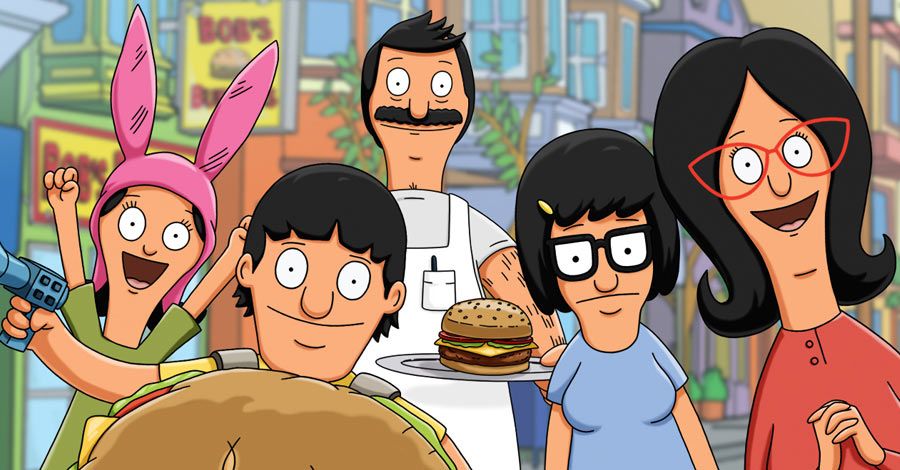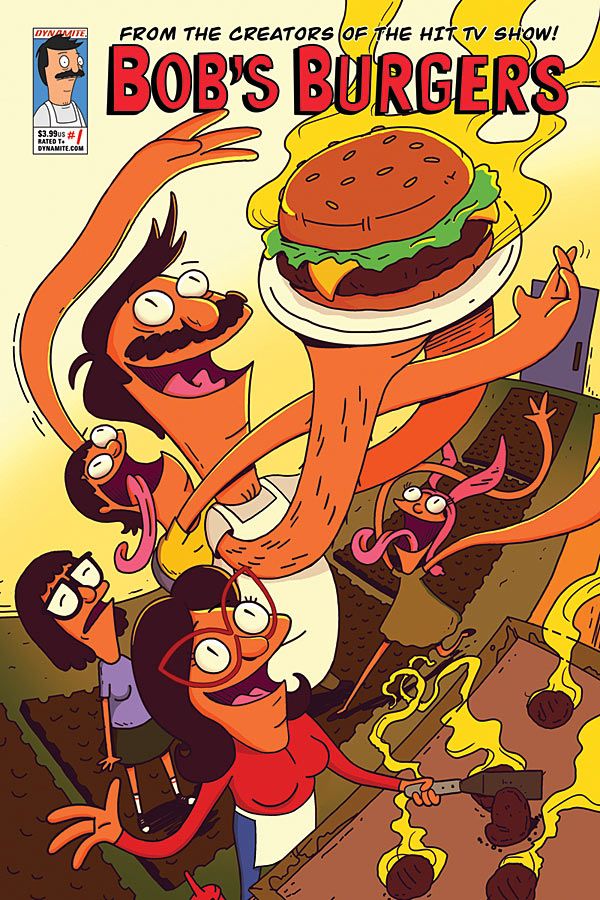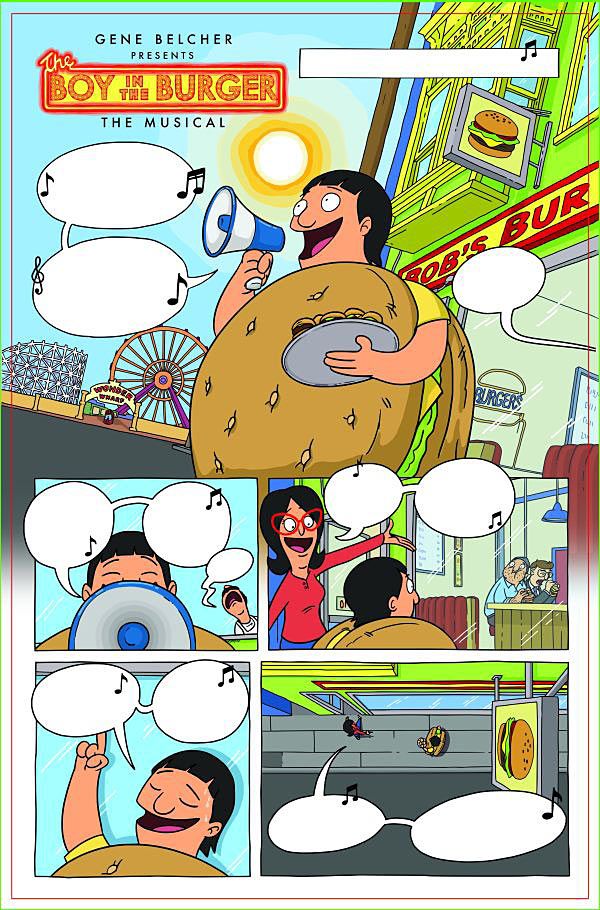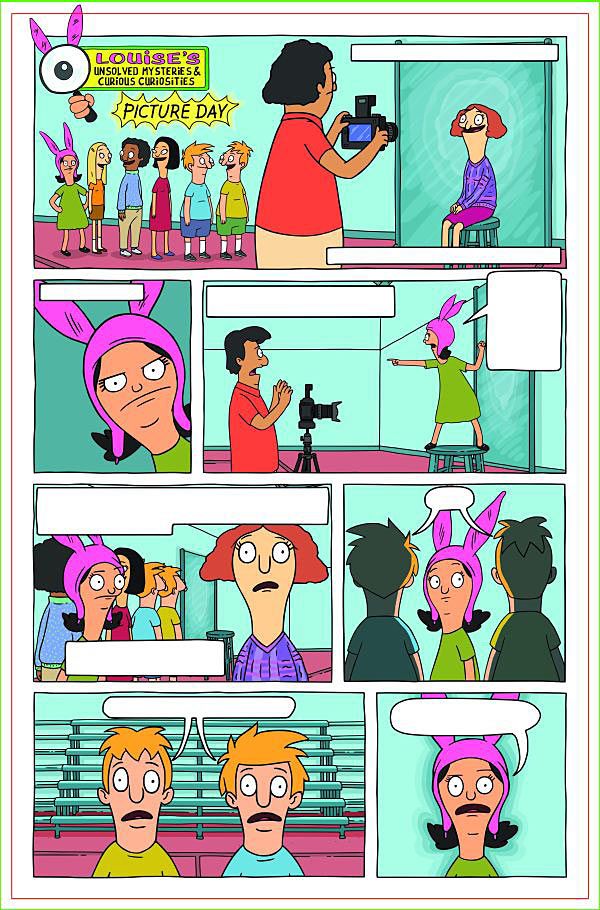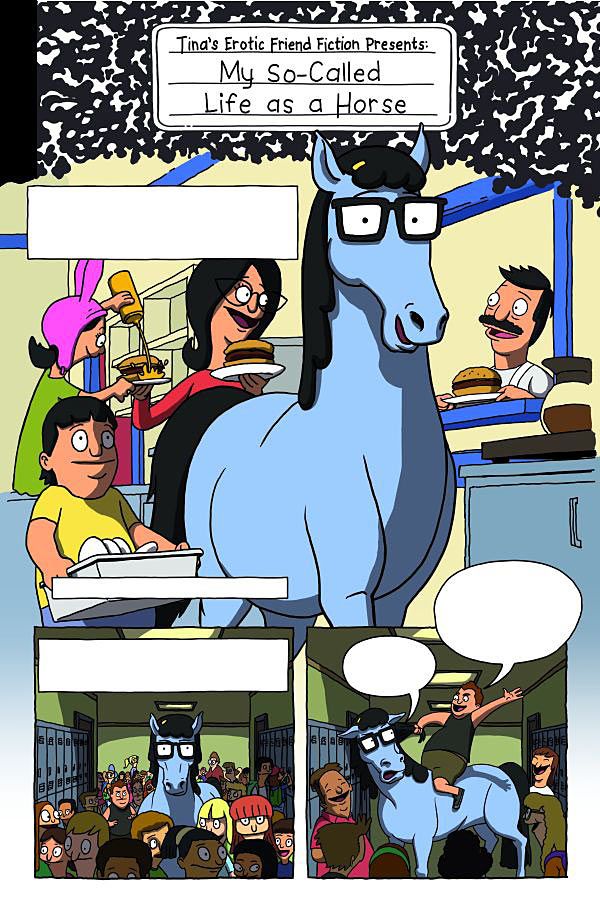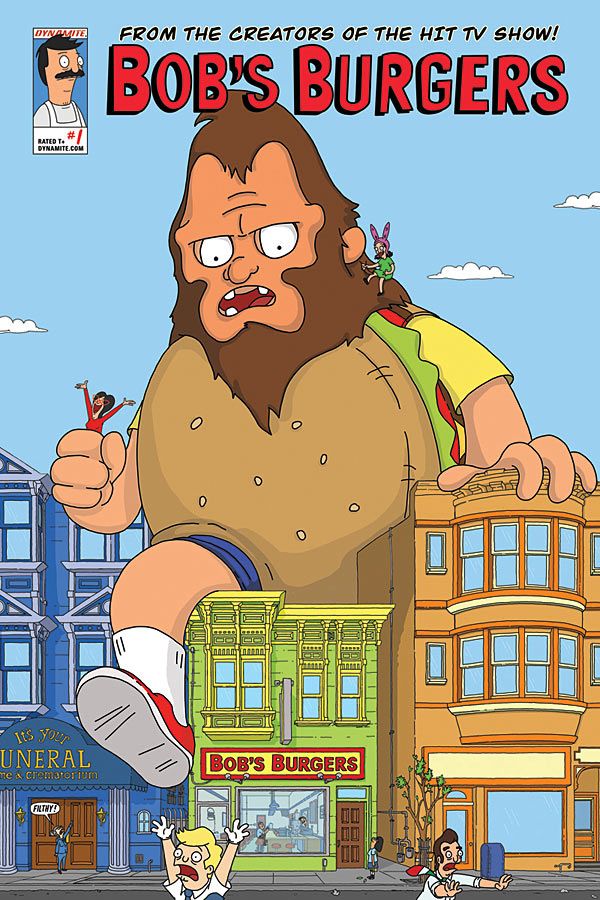There's a long and storied history of animated characters making the jump to comic books, ranging from Donald Duck to Casper the Friendly Ghost to Harley Quinn. The tradition continues this August with "Bob's Burgers," a new Dynamite Entertainment series based on the hit Fox series that wrapped its fourth season last month.
It's a fairly universal experience to pick up a comic book based on an existing property only to discover that it's a quickly thrown together tie-in. It seems that the folks behind "Bob's Burgers" might have had that experience, too, as not only are they getting in front of that potential notion -- the comic's announcement saw series creator Loren Bouchard stating that he didn't want it to be a "sad knock-off" of either the show or the comic book medium in general -- the comic boasts several members of the show's writing and art teams.
RELATED: Dynamite Brings Fox's "Bob's Burgers" to Comic Books
Issue #1 features multiple short stories -- "Louise's Unsolved Mysteries," "Tina's Erotic Friend Fiction," "A Gene Belcher Original Musical," "Letters Written by Linda" and "Bob's Burgers of the Day" -- and will be written by Rachel Hastings, Mike Olsen, Justin Hook and Jeff Drake; with art from Frank Forte, Brad Rader, Bernard Derriman, Tony Gennaro, Liza Epps, Tyler Garrison, Kimball Shirley, Anthony Aguinaldo and Hector Reynoso. While the comic fits into the canon of the show -- which features the Belcher family's charmingly weird adventures frequently revolving around their hamburger restaurant -- the stories are said to take place in a "heightened" version of what fans see on Sunday evenings.
CBR News spoke with Bouchard about the "Bob's Burgers" comic book, the importance of comics to the show's staff, taking advantage of a new storytelling format and the desire to have the comic look like "really amazing fan art."
CBR News: Loren, let's start from the beginning -- after several successful seasons on Fox, what inspired a "Bob's Burgers" comic book? What made the comics medium the right place to take the property next?
Loren Bouchard: It seems like animation and comics both started as entertainment for kids, but both grew and found a wider audience. So, as mediums go, we're like cousins with a lot of the same sensibilities. It's a more natural fit than, say, "Bob's Burgers: The Ballet," though obviously if someone who knew about ballet wanted to produce that we'd be thrilled.
How big of a comic book fan were you going into the project?
I dabbled with comics as a kid -- I regularly visited The Million Year Picnic in Harvard Square to keep an eye out for stuff that interested me. I remember I got especially excited about "The Tick" when it first came out because it made me laugh out loud. Later, I read some graphic novels (along with everyone else in the world). I also read Scott McCloud's "Understanding Comics" hoping to steal some of his insights and apply them to animation, though I don't think I ever succeeded.
Speaking for the artists and writers of the Bob's comic, most were and are avid fans. But their passions are quite eclectic. They run the gamut from European books -- "Asterix" and "Obelix" and "Lucky Luke" -- to the DC and Marvel warhorses, manga series like "Dragon Ball" and Dynamite titles like "The Phantom." It's safe to say that regardless of how we came into the project, everyone came out big fans of the medium.
It's unique to see folks actually working on the TV show so closely involved with a spinoff project like this. How important was it to be hands-on to make sure the comic got it "right," rather than feeling like -- to echo your quote in the initial announcement -- a "sad knock-off"?
We felt it was crucial to have people who live and breathe the show involved in the creation of the book. It's hard, probably impossible to capture the exact tone of a show unless you live inside the world and inside the characters' heads every day. Dynamite was very respectful of our desire to stay true to the show and very patient with us because it takes time to get it right. We tried to put as much effort into it as we do into making the show itself. We feel like we have a contract with our fans -- they expect our best and we never want to disappoint them.
"The Simpsons" has had a long history in comic books, inspiring an entire publishing entity, Bongo Comics. Has the success that show found in the medium inspired this series at all?
We don't expect to duplicate the Simpson's commercial success in any medium. We're inspired by creative success though, in general. The creative success of the "Adventure Time" comic book is a great example. Very impressive.
RELATED: "Bob's Burgers" Creator, Cast Preview Season, Read "Erotic-Con Fiction"
The first issue of the comic has five short stories -- what made that format the right fit? Will that pattern continue, or will there be longer stories mixed in as well?
Five pieces in each issue is a natural structure for us because we can feature the voice of each member of the family. And repeating that structure across issues allowed us to play with "variations on a theme." The lengths of the stories will vary from issue to issue. The hard part is fitting it all into 22 pages.
On a similar note -- how much is the creative team looking to take advantage of telling stories unique to the comic book medium? Stuff that would work in comics but not necessarily in animation?
The comic book is kind of "Bob's Burgers" in its "dream state" -- true to the tone, but heightened in its storytelling -- like the fantasy sequences in the show. We've also given the characters a narrator's voice in each section -- which is very much inspired by Tina's Erotic Friend Fiction, and also by an episode we did called "The Frond Files," where each kid wrote a fantastical essay. We took an aspect of the show that we enjoy but only get to indulge in sometimes on TV and we're just living there in the comic book.
In general, what kind of stories are you looking to tell with the comic? What new territory are you aiming to explore?
We like the idea of "found pages" -- bits of paper that we're imagining are torn from the pages of Bob's Burger Notebook, for example, or letters that Linda has written. This is new territory and it's something that we couldn't do nearly as well on television.
Bob's Burgers already has a very distinct visual style, but is there much room with the comic to experiment a bit outside of that? Based on one of the covers released, it looks like there's a bit of that going on already.
Fooling around with the look and visual style of the characters and the world is one of the really exciting things about the comic book. While we didn't want to stray from the tone of the show, we did want to give our artists free reign to mutate the look, including the character designs, the quality of the line and the color palette. We love all the Bob's fan art that's out there and we wanted the comic to feel like really amazing fan art.
In the original announcement for the comic, it stated that the stories would be "in canon" to the series -- how important is that aspect?
Tina loves butts. Gene loves farts. Louise loves chaos. Bob loves being a "beef artist." Linda loves life itself. They all love each other. That will never change.
The show has had a notable growth over the past few years, with more and more people discovering it and finding out what makes "Bob's Burgers" unique -- for the folks involved with the show, how proud are you of now being able to branch out to a new medium like this?
We feel blessed and grateful for every single person who's ever turned on the show and found that it speaks to them. If we can connect with people in the same way through the comic then we'll be super-double-extra-grateful.
"Bob's Burgers" #1 arrives in August from Dynamite.

